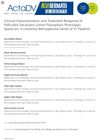 1 citations,
March 2023 in “Clinical, Cosmetic and Investigational Dermatology”
1 citations,
March 2023 in “Clinical, Cosmetic and Investigational Dermatology” Current treatments for Alopecia Areata have mixed success, and there's a need for better, more accessible options and support for affected individuals.
1 citations,
March 2022 in “JAAD case reports” Methotrexate injection site reactions are rare but can be managed by changing injection sites and using topical treatments.
1 citations,
December 2020 in “Case reports in dermatological medicine” A patient with pemphigus vulgaris improved significantly after treatment for an additional viral skin infection.
 1 citations,
March 2019 in “Journal of Interdisciplinary Medicine”
1 citations,
March 2019 in “Journal of Interdisciplinary Medicine” A patient with multiple sclerosis developed skin reactions after Daclizumab treatment, requiring more data on the drug's effects.
 1 citations,
July 2018 in “Elsevier eBooks”
1 citations,
July 2018 in “Elsevier eBooks” Alopecia Areata is an autoimmune hair loss condition, with various treatments showing mixed effectiveness and no guaranteed cure.
 1 citations,
June 2017 in “Skin”
1 citations,
June 2017 in “Skin” Apremilast may help treat lichen planopilaris and frontal fibrosing alopecia when other treatments fail.
 1 citations,
May 2017 in “InTech eBooks”
1 citations,
May 2017 in “InTech eBooks” The document concludes that alopecia areata is an unpredictable autoimmune hair loss condition with no cure, but various treatments exist that require personalized approaches.
 1 citations,
May 2016 in “Current Opinion in Pediatrics”
1 citations,
May 2016 in “Current Opinion in Pediatrics” Children's hair loss can be caused by various factors and should be treated with appropriate, age-specific methods and psychological support.
 1 citations,
January 2014 in “Health Renaissance”
1 citations,
January 2014 in “Health Renaissance” Pseudopelade of Brocq is hard to diagnose and treat, with limited effective options.
 1 citations,
January 2014 in “Hair therapy & transplantation”
1 citations,
January 2014 in “Hair therapy & transplantation” Platelet-rich plasma treatment is not very effective for chronic severe alopecia areata.
 1 citations,
July 2012 in “Springer eBooks”
1 citations,
July 2012 in “Springer eBooks” The document concludes that more research is needed to better understand and treat scarring hair loss conditions.

Certain drugs can worsen hair loss in people prone to androgenetic alopecia.
 June 2024 in “British Journal of Dermatology”
June 2024 in “British Journal of Dermatology” Vitamin B supplements may reverse grey hair.
 June 2024 in “Bangladesh Journal of Medicine”
June 2024 in “Bangladesh Journal of Medicine” Effective alopecia treatment depends on the specific cause and includes medications and procedures.
 April 2024 in “Clinical and experimental dermatology”
April 2024 in “Clinical and experimental dermatology” Tofacitinib is effective for severe alopecia areata, similar to oral betamethasone.
 April 2024 in “Dermatology and therapy”
April 2024 in “Dermatology and therapy” There are significant gaps and inconsistencies in diagnosing and treating alopecia areata in Greece and Italy.
 April 2024 in “Dermatology and therapy”
April 2024 in “Dermatology and therapy” In Denmark from 1995 to 2016, hospital-treated alopecia areata cases increased, mostly affecting women and those over 50.
 March 2024 in “Journal of Endocrinological Investigation”
March 2024 in “Journal of Endocrinological Investigation” Finasteride treatment in rats changed the expression of genes related to psychiatric and neurological functions, and these changes persisted after stopping the drug.
 February 2024 in “Acta dermato-venereologica”
February 2024 in “Acta dermato-venereologica” This type of hair loss is probably often missed and treatments reducing inflammation might work well.
 February 2024 in “BMJ Open”
February 2024 in “BMJ Open” The study concluded that different treatments reduced post-COVID symptoms over time and that factors like age, severity, and comorbidities affect symptom risk.

The woman was diagnosed with lichen sclerosus, a rare skin condition, after initial misdiagnosis and ineffective treatments.
 October 2023 in “The American Journal of Gastroenterology”
October 2023 in “The American Journal of Gastroenterology” Cronkhite-Canada syndrome is rare, with high mortality and cancer risk, needing more research for treatment guidelines.
 September 2023 in “Cureus”
September 2023 in “Cureus” Topical antibiotics successfully treated a rare scalp condition in an elderly man with vitiligo.
 September 2023 in “Fides et Ratio”
September 2023 in “Fides et Ratio” The safety and effectiveness of gender-affirming treatments for children are uncertain, with potential long-term risks like infertility.
 June 2023 in “JAAD Case Reports”
June 2023 in “JAAD Case Reports” A man had a rare skin cancer that looked like a bald spot.
 May 2023 in “Elsevier eBooks”
May 2023 in “Elsevier eBooks” Systemic immunotherapies are used for immune-related hair loss but not usually for genetic hair loss, unless the patient has both conditions.
 May 2023 in “Elsevier eBooks”
May 2023 in “Elsevier eBooks” Some treatments that modify the immune system might help with certain types of hair loss but haven't been explored for common hair loss alone.
 November 2022 in “Journal of the Endocrine Society”
November 2022 in “Journal of the Endocrine Society” A woman with ectopic Cushing's syndrome and COVID-19 passed away despite treatment.
 November 2022 in “Journal of the Endocrine Society”
November 2022 in “Journal of the Endocrine Society” Estrogen deficiency can reduce the enzyme activity needed to activate vitamin D.
 September 2022 in “Polish Hyperbaric Research”
September 2022 in “Polish Hyperbaric Research” Some treatments for hair loss, like finasteride, biotin, and minoxidil, can be effective, but their success varies by individual case.




























